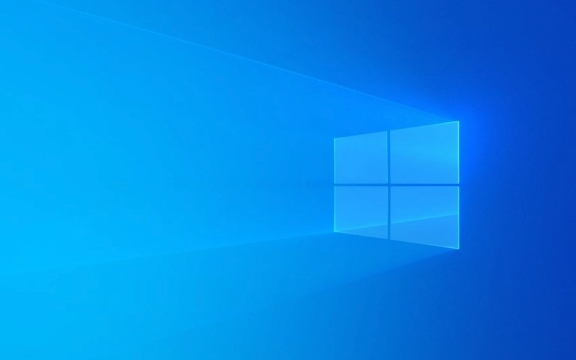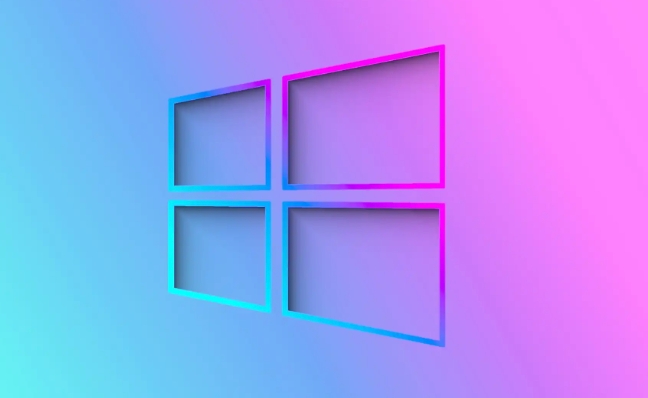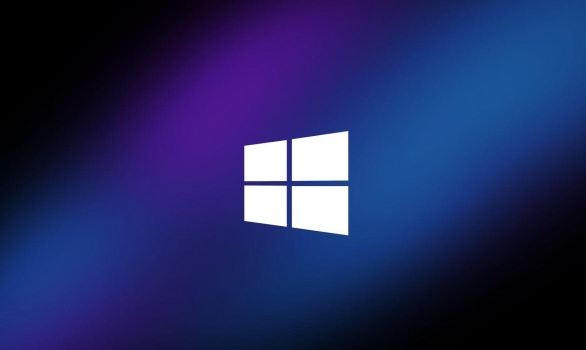When crackling or pop sound occurs, you should check and update the audio driver first. The operation is to open the Device Manager → Sound Device → Right-click to select Update or Uninstall the driver; secondly adjust the power management settings and cancel the "Allow the device to save power" option; then disable the audio enhancement function, enter the device properties → Sound Control Panel → Enhancement tab through the sound settings to check "Disable all enhancements"; finally check external interference such as headphone connection, USB devices, interface replacement and background software impact. Most problems can be solved by updating the driver and adjusting the power settings, which may be hardware problems if persisted.

It is really annoying that there is a crackling sound or a pop of audio in Windows. This situation is usually not because the hardware is broken, but because there is a problem with the setup or driver. The key investigation directions are driver updates, system settings optimization and external interference elimination.

Check and update the audio driver
Most audio exceptions are related to the driver. The drivers that come with Windows may not be fully adapted to your device. It is recommended to go to the motherboard or the official sound card website to download the latest version.
- Open Device Manager → Expand Sound, Video, and Game Controllers
- Right-click your audio device (such as Realtek High Definition Audio) → select "Update Driver"
- If there is no update, you can try "Uninstall the device" and then restart the computer and let the system automatically reinstall it
- Or go to the official website to download and install the latest driver
If you are not sure of the model, you can also use some third-party tools to assist in the detection, such as Driver Booster, Driver Easy, etc., but pay attention to the security of the download source.

Adjust power management settings to avoid interference
Sometimes in order to save power, Windows will automatically turn off the USB port, which may cause intermittent sound from external sound cards or headphones.
Operation steps:

- Or in "Device Manager" → Find your audio device
- Right-click → Properties → Power Management
- Remove the hook before "Allow the computer to turn off this device to save power"
This small setting is ignored by many people, but it is very helpful in solving noise, especially when using USB sound card or Bluetooth headset.
Disable audio enhancement
Some audio enhancements that are enabled by default in Windows will cause sound breaks or delays in some devices.
The processing method is as follows:
- Right-click the taskbar volume icon → “Open Sound Settings”
- Select the output device currently in use → Click "Device Properties"
- Find Sound Control Panel under Related Device Settings
- Double-click your output device → Switch to the Enhancement tab
- Check "Disable all enhancements"
Some systems do not have the "Enhancement" tab, which may be because the driver does not support or has simplified this part of the functionality. If not found, you can also skip it.
Troubleshoot other common sources of interference
Sometimes the problem is not the system itself, but the noise interference caused by external factors:
- Check headphone/speaker connection : loose plugs and oxidation of interfaces can also cause intermittent bursts
- Unplug other USB devices and try it : Especially peripherals with fans and lighting effects may cause electromagnetic interference
- Replace USB port : Some front panels are powered unstable, and the rear interface is more reliable
- Close applications that occupy audio in the background : such as Steam, Discord and other software sometimes preempt audio resources
In addition, if you are using wireless headphones, it may also be a problem of signal interference. Try to stay away from your router or other Bluetooth devices as much as possible.
Basically these common inspection methods. In most cases, updating the driver and adjusting the power settings can solve the problem. If it does not affect daily use, it may be that some settings are not adjusted properly; but if they have always existed, you have to consider whether the hardware is aging or poor line contact.
The above is the detailed content of Troubleshooting audio crackling or popping in Windows. For more information, please follow other related articles on the PHP Chinese website!

Hot AI Tools

Undress AI Tool
Undress images for free

Undresser.AI Undress
AI-powered app for creating realistic nude photos

AI Clothes Remover
Online AI tool for removing clothes from photos.

Clothoff.io
AI clothes remover

Video Face Swap
Swap faces in any video effortlessly with our completely free AI face swap tool!

Hot Article

Hot Tools

Notepad++7.3.1
Easy-to-use and free code editor

SublimeText3 Chinese version
Chinese version, very easy to use

Zend Studio 13.0.1
Powerful PHP integrated development environment

Dreamweaver CS6
Visual web development tools

SublimeText3 Mac version
God-level code editing software (SublimeText3)
 Windows 11 slow boot time fix
Jul 04, 2025 am 02:04 AM
Windows 11 slow boot time fix
Jul 04, 2025 am 02:04 AM
The problem of slow booting can be solved by the following methods: 1. Check and disable unnecessary booting programs; 2. Turn off the quick boot function; 3. Update the driver and check disk health; 4. Adjust the number of processor cores (only for advanced users). For Windows 11 systems, first, the default self-start software such as QQ and WeChat are disabled through the task manager to improve the startup speed; if you use dual systems or old hardware, you can enter the power option to turn off the quick boot function; second, use the device manager to update the driver and run the chkdsk command to fix disk errors, and it is recommended to replace the mechanical hard disk with SSD; for multi-core CPU users, the kernel parameters can be adjusted through bcdedit and msconfig to optimize the startup efficiency. Most cases can be corrected by basic investigation
 How to Change Font Color on Desktop Icons (Windows 11)
Jul 07, 2025 pm 12:07 PM
How to Change Font Color on Desktop Icons (Windows 11)
Jul 07, 2025 pm 12:07 PM
If you're having trouble reading your desktop icons' text or simply want to personalize your desktop look, you may be looking for a way to change the font color on desktop icons in Windows 11. Unfortunately, Windows 11 doesn't offer an easy built-in
 Fixed Windows 11 Google Chrome not opening
Jul 08, 2025 pm 02:36 PM
Fixed Windows 11 Google Chrome not opening
Jul 08, 2025 pm 02:36 PM
Fixed Windows 11 Google Chrome not opening Google Chrome is the most popular browser right now, but even it sometimes requires help to open on Windows. Then follow the on-screen instructions to complete the process. After completing the above steps, launch Google Chrome again to see if it works properly now. 5. Delete Chrome User Profile If you are still having problems, it may be time to delete Chrome User Profile. This will delete all your personal information, so be sure to back up all relevant data. Typically, you delete the Chrome user profile through the browser itself. But given that you can't open it, here's another way: Turn on Windo
 How to fix second monitor not detected in Windows?
Jul 12, 2025 am 02:27 AM
How to fix second monitor not detected in Windows?
Jul 12, 2025 am 02:27 AM
When Windows cannot detect a second monitor, first check whether the physical connection is normal, including power supply, cable plug-in and interface compatibility, and try to replace the cable or adapter; secondly, update or reinstall the graphics card driver through the Device Manager, and roll back the driver version if necessary; then manually click "Detection" in the display settings to identify the monitor to confirm whether it is correctly identified by the system; finally check whether the monitor input source is switched to the corresponding interface, and confirm whether the graphics card output port connected to the cable is correct. Following the above steps to check in turn, most dual-screen recognition problems can usually be solved.
 Want to Build an Everyday Work Desktop? Get a Mini PC Instead
Jul 08, 2025 am 06:03 AM
Want to Build an Everyday Work Desktop? Get a Mini PC Instead
Jul 08, 2025 am 06:03 AM
Mini PCs have undergone
 Fixed the failure to upload files in Windows Google Chrome
Jul 08, 2025 pm 02:33 PM
Fixed the failure to upload files in Windows Google Chrome
Jul 08, 2025 pm 02:33 PM
Have problems uploading files in Google Chrome? This may be annoying, right? Whether you are attaching documents to emails, sharing images on social media, or submitting important files for work or school, a smooth file upload process is crucial. So, it can be frustrating if your file uploads continue to fail in Chrome on Windows PC. If you're not ready to give up your favorite browser, here are some tips for fixes that can't upload files on Windows Google Chrome 1. Start with Universal Repair Before we learn about any advanced troubleshooting tips, it's best to try some of the basic solutions mentioned below. Troubleshooting Internet connection issues: Internet connection
 How to clear the print queue in Windows?
Jul 11, 2025 am 02:19 AM
How to clear the print queue in Windows?
Jul 11, 2025 am 02:19 AM
When encountering the problem of printing task stuck, clearing the print queue and restarting the PrintSpooler service is an effective solution. First, open the "Device and Printer" interface to find the corresponding printer, right-click the task and select "Cancel" to clear a single task, or click "Cancel all documents" to clear the queue at one time; if the queue is inaccessible, press Win R to enter services.msc to open the service list, find "PrintSpooler" and stop it before starting the service. If necessary, you can manually delete the residual files under the C:\Windows\System32\spool\PRINTERS path to completely solve the problem.







